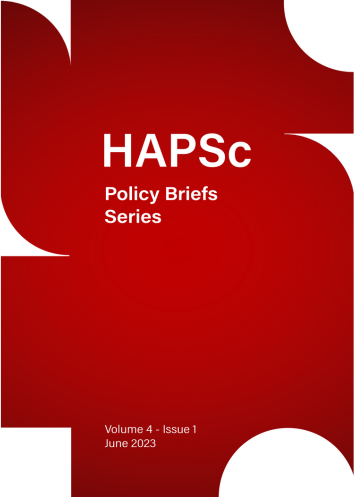The Greco-Albanian Relations During the Period 1974-1996: From Irredentism to Political Realism
Resumen
Greece and Albania are two countries that confronted each other several times during the first decades of the 20th century. The fact that both Albanians and Greeks were living for centuries in the same geographical region (Epirus) caused several disputes and the intervention of the Great Powers. However, after several years of armed or political confrontation (1913-1945), Greece understood the necessity for peaceful coexistence. The effort to re-establishment their relations was not easy because of the power of the nationalistic organizations. This paper aims to describe how political realism prevailed against irredentism.
Article Details
- Cómo citar
-
Peponas, M. (2023). The Greco-Albanian Relations During the Period 1974-1996: From Irredentism to Political Realism. HAPSc Policy Briefs Series, 4(1), 64–69. https://doi.org/10.12681/hapscpbs.35184
- Sección
- Articles

Esta obra está bajo una licencia internacional Creative Commons Atribución 4.0.
Authors retain copyright and grant the journal right of first publication with the work simultaneously licensed under a Creative Commons Attribution License that allows others to share the work with an acknowledgement of the work's authorship and initial publication in this journal.Descargas
Los datos de descargas todavía no están disponibles.
Citas
Britannica, T. Editors of Encyclopaedia (2023, April 7). Enver Hoxha. Encyclopedia Britannica. Available at: https://www.britannica.com/biography/Enver-Hoxha (Accessed: 02/05/2023).
CIA, ESDN (CREST): 0005657435, 30 June 1993.
CIA, RDP85T00287R000502170001-8, 27 October 1983.
Karamouzi, E. (2015). A Strategy for Greece: Democratization and European Integration, 1974-1975. Cahiers de la Méditerranée, 90, 11-24.
Kontis, V. (1994). Vulnerable Balance. Greece and Albania during the 20th century. Thessaloniki: Paratiritis [in Greek].
Makedonia [Mακεδονία]. vol. 17.751, 25-1-1972.
Manta, Ε. (2004). The Muslim Chams of Epirus (1923-2000). Thessaloniki: Institute of Balkan Studies [in Greek].
Margaritis, G. (2005). Unwanted compatriots. Athens: Vivliorama [in Greek].
Ntagios, S. (2015). Greece and Albania. 50 years of mutual mistrust. Literatus: Thessaloniki [in Greek].
Sfetas, S. (2021). The re-establishment of the Greco-Albanian diplomatic relations (1970-1971). In: Maratzidis, N. & Skoulidas, E. (ed.), Greece and Albania in Cold War. Athens: Alexandria, pp. 165-182 [in Greek].
Skoulidas, E. (2021). The Central Commission of the Northern Epirus Struggle: Ideology and Policy during the first decades of the Cold War. In: Maratzidis, N. & Skoulidas, E. (ed.), Greece and Albania in Cold War. Athens: Alexandria, pp. 143-164.
Triantaphyllou, D. (1997). Greece and the Balkans since 1974. Études helléniques / Hellenic Studies, 5(2), 169–182.
Valden, S. (2017). The Greek dictatorship and the Eastern countries (1967-1974). The Hellenic Review of Political Science, 13, 123 – 139 [in Greek].
Vickers, M. (2001). The Albanians. A Modern History. London, New York: I.B. Tauris.
Woodhouse, C. M. (1985). The Rise and Fall of the Greek Colonels. London: Granada.



